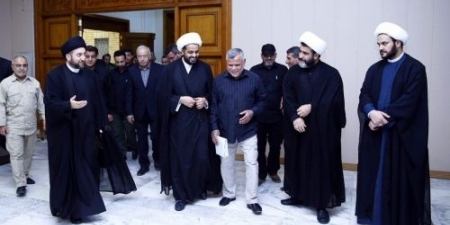Written by Arkan Radeef
Frédéric Bastiat once said, “When looting becomes a way of life for a group of men in society, over time, they will create a legal system to authorize it and an ethical code to glorify it.” This perspective sheds light on the situation in Iraq, where Iranian-backed militias have entrenched themselves within the political and economic system, undermining the country’s stability.
Iran’s involvement in Iraq began with the creation of militias aimed at expanding Tehran’s influence. Initially, Iran supported these groups both financially and militarily, but the imposition of U.S. sanctions on Iran shifted the dynamic. The militias became key to Iran’s financial strategy, utilizing Iraq’s resources to fund Tehran’s operations and to maintain a strong presence in the region.
Today, Iran’s affiliated militias control significant portions of Iraq, particularly in areas like Basra and Baghdad. According to the U.S. Military Academy, after 2014, these militias developed intricate networks to control Iraq’s resources, using them to support Iran and its allies. This expanded network came to prominence in 2018 under the Popular Mobilization Forces (PMF), led by Abu Mahdi al-Muhandis, a figure with close ties to Iran. The power of these militias grew as they took control of critical positions within Iraq’s political system, particularly after the appointment of Adel Abdul Mahdi as Prime Minister.
Militias infiltrated Iraq’s government and its economic sectors. For example, Abu Jihad al-Hashimi, a senior leader in the Badr Organization, took control of the Prime Minister’s office and further consolidated militia power by manipulating contracts and resources. This allowed militias to expand their control over key industries, including oil, banking, and trade.
One of the most lucrative sources of funding for these militias has been the oil industry. Militias seized control of small oil fields in Iraq and employed networks of shipping companies to smuggle stolen oil. Additionally, to circumvent U.S. sanctions, Iranian oil was trafficked through Iraqi ports, repackaged, and sold as Iraqi oil. These militias also controlled customs operations, extorting money from traders by creating “customs facilitator” offices that protected goods in exchange for bribes.
Another significant financial channel was the manipulation of Iraq’s public sector payrolls. Militias exploited the government’s payroll system, creating fake names to siphon off millions of dollars in salaries each month. They also built vast real estate empires by using their political leverage to control Iraq’s property market.
Militia leaders like Shibl al-Zaydi, commander of the Imam Ali Brigades, have become some of the wealthiest men in Iraq through corrupt practices. Al-Zaydi, who is also linked to the Iranian Quds Force, exploited his position in the Ministry of Communications to secure telecom contracts for his family, adding further layers to the corrupt network.
Figures like Mohammad al-Kawtharani, a leader within Hezbollah’s Iraqi branch, and Qais al-Khazali, head of Asa’ib Ahl al-Haq, are also implicated in a range of illicit activities, from manipulating contracts to stealing oil. These leaders have created vast financial networks not only within Iraq but also beyond its borders, using their militia power to launder and smuggle funds out of the country.
Iraq’s deepening corruption and militia influence have created a cycle that is difficult to break. While proposals to address the issue have been put forward, they face significant challenges. Expanding sanctions against the militias, strengthening Iraq’s military to reduce sectarian influence, and dismantling the militias entirely are all potential solutions. However, these reforms are complicated by the current government’s sectarian and militia-driven politics, along with the fact that the state lacks the strength to confront these powerful factions.
Ultimately, the control that Iran-backed militias have over Iraq’s political and economic systems represents a major obstacle to the country’s development. Until Iraq can break free from this entrenched system of corruption and militia control, its path toward stability and prosperity remains uncertain.

Iraq has sadly become a place where corruption runs deep, with dishonesty and theft spreading at all levels. Once a country full of history and hope, it is now being taken advantage of by people who use its resources for their own benefit, hurting the country’s progress and the wellbeing of its citizens.
هذا ما جلبته مخلفات ايران
In the name of religion these militias cover all their crimes hiding behind faith to justify violence and oppression. It’s heartbreaking how power and ideology can be twisted for such harmful agendas.
You have remarked very interesting points! ps decent site. Sheree Brod Grey
the deep-rooted corruption and control of Iran-backed militias in Iraq which continue to undermine the country’s political and economic stability.
Very good write-up.
Very good article! We are linking to this particularly great content on our site. Keep up the great writing. Claudie Regan Perloff
I like it.
Great point
it is so sad.
It’s truly heartbreaking to hear about what’s happening in Iraq. Once home to the first civilization in the world, it now finds itself torn apart, becoming a battleground for thieves and killers. The contrast is devastating.
I really like it whenever people come together
and share ideas. Great website, stick with it!
Militant groups such as Hezbollah pose a significant threat in the Middle East. Countries must unite and work together to eliminate these dangerous militias.
interesting
It’s disturbing how these militias cloak their crimes in religious rhetoric, manipulating people’s devotion to carry out violence and terror. This is not faith, it’s exploitation.
thank you so much
There’s a lot of folks that I think would
I like what you guys are up too. Such clever work and exposure!
Thanks
That’s right all of them are supported from Iran.